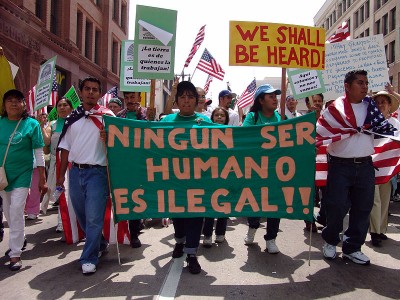The Obama administration’s announcement on June 15th that it will stop deporting young undocumented immigrants who meet certain criteria prompted celebrations and fuming by those on both sides of the immigration debate. But as the news has sunk in, the people who will actually be affected by the policy change—undocumented immigrants age 30 or younger who have lived here at least five years, have no criminal record, and are in school or have a high school diploma—are reacting with both joy and a degree of wariness.
“Undocumented students say they are anxious to see how the policy will be put into effect—they have been disappointed by the Obama administration before. But they think it is a big step in the right direction,” the Chronicle of Education reported last week.
Obama’s order is similar to the DREAM Act, a bill that would provide a path to legal residency for immigrant college students (or young adults who join the military) who are in the United States illegally. The bill has been reintroduced in Congress every year for the past decade.
In California, which has a large population of young immigrants from Asia and Latin America who will likely be affected by the policy change, many are calling and emailing advocacy groups with questions. “There’s just a real hunger and thirst for more information,” Betty Hung, policy director for the Asian Pacific American Legal Center, told California Watch. The groups are warning immigrants to be wary of fraudsters offering to help with their applications.
For many immigrants, high tuition costs may still bar their access to a college education. The vast majority of states require undocumented immigrants to pay out-of-state tuition at public institutions. In New York, Obama’s order has led immigrant advocates to push for a stalled bill that would give undocumented students access to financial aid, but it seems unlikely it will pass, according to Gotham Schools.
At the same time, some are speculating that Obama’s order could make a more comprehensive overhaul of the immigration system more difficult. There are an estimated 11 million undocumented immigrants in the United States, but only about 800,000 of them will be affected by the new policy, according to calculations by the Obama administration. “Did the president hurt immigration reform’s long-term prospects by doing a short-term fix that conservatives saw as an end run around congressional authority and the Constitution?” the Christian Science Monitor asked in an article published on the day of the announcement.
Another group that will be directly affected by the order is colleges and universities. On July 10th, the presidents of more than 100 research universities sent a letter to Obama and four Congressional leaders that suggested Obama’s order—which would likely expand the number of people applying to attend their schools—hadn’t entirely satisfied this constituency. In the letter, the presidents expressed concern than many high-performing international students are unable to stay and work in the United States once they graduate.
“The US cannot afford to wait to fix our immigration system,” they wrote. “We ask you to work together to develop a bipartisan solution that ensures our top international graduates have a clear path to a green card, so they can stay and create new American jobs.”




